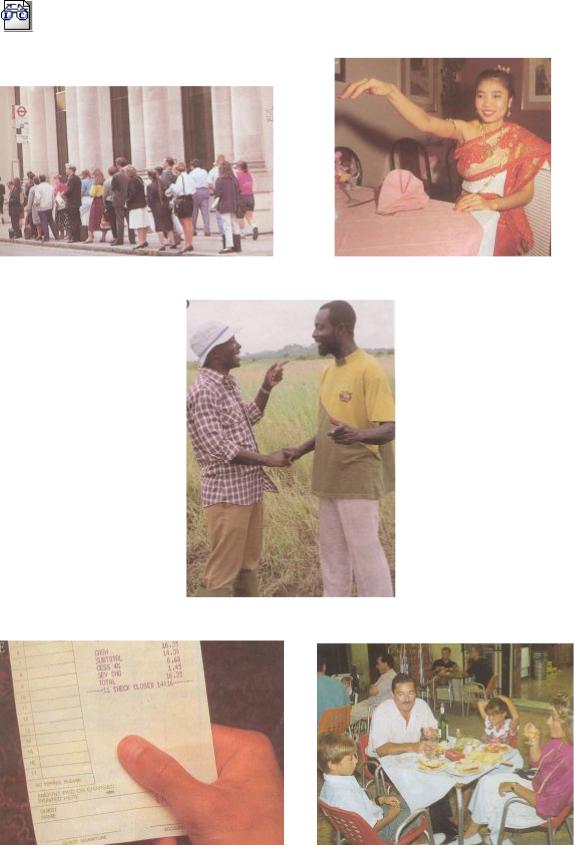
Uchebnik_lakhotyuk_mikhaylova
.pdf
Character
Americans admire strong, self-reliant, individual people. American heroes include outlaws such as Jesse James, successful entrepreneurs like Sam Walton (the founder of the Wal-Mart superstores), and
tough guys like Humphrey Bogart and John Wayne. They hate being dependent on other people, or having others depend on them. Other cultures who like to depend on family or friends may view this as "selfishness".
The British are similar in the sense that they like to be independent, but this is mainly as a way of avoiding confrontation. British heroes include James Bond, Mr Bean and Benny Hill.
Health and Beauty
Americans like to feel and look good. And they spend millions on drugs, books, and various forms of psychotherapy in order to achieve this. They attend group therapy sessions, and participate in self-discovery classes.
Helpful books include I'm OK; You're OK; Feeling Good; and The Seven Habits of Highly Effective People. In general, Americans have a positive outlook on life, and a go-getting, problem-solving attitude to difficulties.
The British are starting to be more like the Americans in this respect; although they aren't so addicted to all the pills and medicines. When the Brits get depressed, they prefer to have a cup of tea, or go to the pub.
Enthusiasm and Emotion
In general, Americans are very open people, and aren’t afraid to show enthusiasm or emotion in public. During sporting events they may shout words of encouragement such as, “Yeah! Go man, go!”
And while playing games they may slap one another on the back and jump up high in the air, especially if they are winning.
The British, on the other hand, have always been taught to act avoid any demonstration of emotion. Extreme enthusiasm, crying, making a scene, and a loss of control is seen as something really bad in Britain. They are traditionally told “to keep a stiff upper lip”. Just look at the following example from the Battle of Waterloo (1815):
Captain Jones: “Good God, sir. Your leg has been blown off!”
General Barker: “Oh, yes. I believe it has. But don’t worry; I still have the other one.”
However, this absurd character trait is gradually disappearing as young Brits become more like their American cousins thanks to the influence of television and cinema.
112

 8.3 Student B. Read some articles that show the difference between British and American style of life, habits, traditions, character traits. Tell them to your partner. These words will help you.
8.3 Student B. Read some articles that show the difference between British and American style of life, habits, traditions, character traits. Tell them to your partner. These words will help you.
1. to sit around |
to sit in a place doing nothing |
2. to sip a drink |
to take a small amount of drink |
3. to creep up |
to go to a higher level very slowly |
4. fuss |
hysteria |
5. get a grip on yourself |
control yourself |
6. to keep a stiff upper lip |
to remain calm in tense situations |
7. straight to the point |
saying what you want to say directly |
8. to sort out a problem |
to solve a problem |
9. to wave something on |
to move an object from side to side directly in front |
someone’s face |
of someone’s face |
10. to stick with |
to continue using something |
something |
to arrive |
11. to turn up |
|
12. buddy |
infml. a friend |
13. to curse |
if you curse someone, you say bad things about that |
|
person |
14. agonizing |
very uncomfortable, painful |
15. painful |
causing pain: that hurts you |
 Sinking Ships: reacting When Americans find themselves in a desperate situation, they know how to act. Americans are creatures of action, and they will take decisive steps to avoid injury or death. They won't sit around waiting for something to happen. Oh, no, they'll go out there and do something about it, and they'll ask things like, "What can we do to get out of this situation?" Or "Does anyone know how to get out of here?" Or, "Who's the guy in charge here?" Then they'll motivate one another by saying things like, "OK, let's go!" or "Let's rock!"
Sinking Ships: reacting When Americans find themselves in a desperate situation, they know how to act. Americans are creatures of action, and they will take decisive steps to avoid injury or death. They won't sit around waiting for something to happen. Oh, no, they'll go out there and do something about it, and they'll ask things like, "What can we do to get out of this situation?" Or "Does anyone know how to get out of here?" Or, "Who's the guy in charge here?" Then they'll motivate one another by saying things like, "OK, let's go!" or "Let's rock!"
For the British, on the other hand, it is undignified to react with decision in a desperate situation. Take the example of
the Titanic. As the ship was slowly sinking, English gentlemen sat around the bar, slowly sipping their drinks and enjoying the music from the ship's orchestra. And as the water slowly crept up higher and higher, they ignored it, preferring to continue
their light chat. For the British it is important to remain calm and in control of oneself even in life-and-death situations. They'll make comments such as,
113

"I don't know what all the fuss is about." Or, "Get a grip on yourself, man." Or, "There's no need to get hysterical." Or, the all time classic, "We're British. Keep a stiff upper lip
Cold Food: complaining. When it comes to complaining, Americans are practical and straight to the point. They'll tell you what the problem is, and expect you to sort it out immediately. At work they may say, "I didn't get that report. When are you going to get it to me?" Or, at a restaurant, "This food is cold. Heat it up, would you?" And in a bar, "Hey, how much longer am I gonna
have to stand here before you serve me?" as they wave some money in the waiter's face. And if nothing happens in the next minute, they'll leave. Of course, the British are much more reserved when it comes to complaining. And they will try their best to avoid a confrontation. In fact, they’d rather stick with an unhappy situation than cause any trouble. And if they have to say something, they’ll apologise. So, in the work-related situation, they may say, "I'm awfully sorry to bother you but that report never arrived. It must be something to do with the post. I don't suppose you could send it again, could you?" And at a restaurant they may say, "I don't mean to cause any trouble, but I'm afraid this food is somewhat cold. If the chef isn't too busy, I don't suppose he could heat it up a bit, could he?" And in a bar he may say, "I'm sorry to bother you, but I was wondering, if it wasn't too much trouble, whether you could possibly serve me a drink, please?" And they'll sit there for another half hour even if nothing happens. The only exception is Yorkshire (north England), where not getting served for half-an-hour could result in the ritual sacrifice of the barman.
Unexpected Funerals: invitations
When it comes to invitations, Americans are very forward. They'll invite you to come to their house, and they'll expect you to turn up. If you don't go, they'll ask you why you didn't come, "What happened? Did you forget?" Americans have no problem telling someone to go away if that person turns up unannounced. You'll be told, quite literally, to go away. "Hey, I'm sorry," Americans will say, "but I'm right in the middle of something. Could you come back later?" Or, "Hey, buddy, this isn't a good moment. I'll see you another time. Right?" And lastly, if you ask an American out, and they don't want to go, they'll simply say, "I'll take a rain check on that", which means that they don't want to go this time, but may go on another occasion. Of course, the British are very different. When the British invite you to their house, they don’t actually expect you to turn up. “How wonderful to see you!” they’ll say. Or “What a nice surprise!” Or “I
114
can’t believe you came”. At the same time, they’ll be cursing you for ever believing that their invitation was sincere.
Having to say “no” to an invitation is perhaps one of the most agonizing things for a British person. They find it really painful to reject someone or potentially hurt their feelings. When trying to say no, they’ll make a whole series of apologies, excuses and pathetic lies such as, “Oh, I’ve just remembered that I had to go to my uncle’s funeral I’m awfully sorry.”
 8.3 Student A. Listen to a British lady and US man telling us about British and American attitudes to honesty, class and tradition. These words will help you.
8.3 Student A. Listen to a British lady and US man telling us about British and American attitudes to honesty, class and tradition. These words will help you.
a sense of suspicion |
if you have “ a sense of suspicion” you don’t |
|
believe things |
What are you after? |
What do you want? |
I mustn’t grumble |
I shouldn’t complain |
to live the American |
to become a rich successful person |
dream |
an insulting term to refer to poor uneducated |
white trash |
|
|
white Americans |
hillbillies |
an insulting term to refer to poor Americans who |
|
live in rural areas |
to pull something down |
to deliberately destroy a building |
 8.4 Student B Listen to a southern Englishman and US man telling about British and American attitudes to sport, success and anger. These words will help you.
8.4 Student B Listen to a southern Englishman and US man telling about British and American attitudes to sport, success and anger. These words will help you.
to kick some ass |
to win games in an aggressive form |
you suck |
you are very bad |
to get your revenge |
to do something bad to someone who has done |
|
something bad to you |
bowls |
a game played with large, heavy balls. You have to |
|
roll the ball on the ground to get near another |
|
smaller ball |
gnome tossing |
throwing gnomes |
don’t take defeat lightly |
get very angry when they lose |
a guy |
a person |
fair play |
obeying the rules, regulation of a game |
a crushing defeat |
a terrible loss |
115

deep down |
really, truly |
flash clothes |
sophisticated, vulgar, expensive clothes |
to despise |
to hate |
to show off |
to show everybody how good you are at something |
|
or how rich you are |
to punch |
to hit with a closed hand |
envy |
a feeling of anger because someone has something |
|
that you want |
new money |
this expression is used to refer to people who have |
|
recently become very rich |
to fall |
to lose money, status |
in for trouble |
if you are ‘in for trouble’, you are going to be |
|
punished for something |
a windmill |
a type of building with large sails that go round in |
|
the wind. |
 8.5 Summarise everything you have read and heard and write an analytical article about differences between British and American national characters. Try not only to establish facts but also express your attitude towards them. Which traits appeal to you and which appall you? Compare them with those of Russian national character.
8.5 Summarise everything you have read and heard and write an analytical article about differences between British and American national characters. Try not only to establish facts but also express your attitude towards them. Which traits appeal to you and which appall you? Compare them with those of Russian national character.
Use the expression “When it comes to …” and the conjunction “whereas” (e.g. When it comes to giving gifts, Americans are very generous whereas the British feel tense and suspicious about a present giver.)
(9) Some other customs and traditions
 9.1 Check if you know these expressions. If not, learn them!
9.1 Check if you know these expressions. If not, learn them!
1. |
(to) arrange to meet someone |
14.(to) nod one’s head |
|
2. |
avoid looking smb in the eye |
15.(to) point at smb with a |
|
3. |
attract someone’s attention |
|
finger |
4. |
(to) be asked out to a meal |
16. |
(to) be offended |
5. |
(to) drop litter |
17. |
(to) put smth aside |
6. |
(to) flush the toilet |
18.a restaurant fills up |
|
7. |
gap in a conversation |
19.second helping |
|
8. |
(to) get response |
20. |
(to) shake hands |
9. |
(to) hold hands |
21.sign of respect |
|
10.it is insulting to do smth |
22.spiritual part of a body |
||
11. |
(to) invite smb for a drink |
23.no tipping |
|
12.(to) jump the queue
13.(to) kiss smb on a cheek
116

9.2 Look at the pictures below and have a guess where they were taken.
.
117

|
|
9.2 |
Here are some texts A-E containing tips for visitors to five different |
parts of the world. Read them and say which text, do you think, is about: |
|||
-Britain? |
-Thailand? |
||
-Spain? |
West Africa? |
||
-Singapore?
 Don’t be surprised if people you don’t know well ask you how much you earn or how much your car costs. This is quite normal.
Don’t be surprised if people you don’t know well ask you how much you earn or how much your car costs. This is quite normal.
If you are invited for a meal, people will always offer you a second helping. You should always say “No”, so as not to appear greedy. This will be understood, and your host will give you more anyway. If you really don’t want any more, cover your plate with your hand.
It is polite to leave some food on your plate at the end of a meal – if you eat everything; it’s a sign that you want more.
Don’t drop litter – even cigarette ends. It will be noticed, and you’ll be fined. You can also be fined if you fail to flush the toilet in a restaurant or other public place.
In general, it is considered insulting to give tips, and many places have signs saying” No tipping.
 Greetings can go on for some time –“How are you? How is the day? How‘s business? How’s the family?” Your answer should always be “Fine”, even if you are not. If there’s a gap in the conversation, this is usually filled with more greetings.
Greetings can go on for some time –“How are you? How is the day? How‘s business? How’s the family?” Your answer should always be “Fine”, even if you are not. If there’s a gap in the conversation, this is usually filled with more greetings.
Holding hands is common, even between strangers. Don’t be surprised if someone showing you the way down the street leads you by hand.
In general, the left hand is used for ‘unclean’ activities, so use the right hand for giving things to people, handling food, etc.
People younger than you will avoid looking you straight in the eye. This is not rude – on the contrary, it’s a sign of respect.
Hissing is a common way of attracting a person’s attention, and it is not rude. It’s quite normal to hiss to call a waiter to your table.
 Kissing is not common as a form of greeting unless you know someone well. It is especially unusual between men, who usually shake hands or just say ‘Hello’ without touching. People usually kiss on one cheek only.
Kissing is not common as a form of greeting unless you know someone well. It is especially unusual between men, who usually shake hands or just say ‘Hello’ without touching. People usually kiss on one cheek only.
Unless you know someone well, it’s impolite to ask them how much they earn, or how much they paid for something.
118

In shops and at bus stops, go to the back of the queue and wait. If you ‘jump the queue, other people will angrily tell you to wait your turn.
Punctuality is important. If you arrange to meet someone, try not to be more than a few minutes late.
On trains, especially underground trains, people tend to sit in silence and read. If you try to start a conversation with a person next to you, don’t be surprised if you don’t get much of the response.
 People regard their homes as very private places, so if you are asked out to a meal it’ll probably be to a restaurant rather than to person’s house or flat.
People regard their homes as very private places, so if you are asked out to a meal it’ll probably be to a restaurant rather than to person’s house or flat.
It’s common to see young children eating in restaurants with their parents, even quite late at night.
Evening activity starts late. Restaurants start to fill up around 10 o’clock, and nightlife can carry on till 4 or 5 in the morning – or even later.
Kissing (on both cheeks) is a common form of greeting between women and men. It is unusual between men, except when greeting a member of the family or a close friend.
If it’s your birthday, you are expected to invite friends or colleagues for a drink or a meal. You’re the host, so you are expected to pay.
 The head is considered the most spiritual part of the body, and the feet the dirtiest part, and it is very impolite to point your foot at someone, especially at their head. So don’t sit with one leg crossed over the other, and never put your feet up on a chair or a desk.
The head is considered the most spiritual part of the body, and the feet the dirtiest part, and it is very impolite to point your foot at someone, especially at their head. So don’t sit with one leg crossed over the other, and never put your feet up on a chair or a desk.
It is also rude to point at people with your finger. If you must point at someone, do it by nodding your head. If you want to call a waiter, do it with your palm down, moving your fingers towards you.
It’s quite normal to visit people at home without being invited. If you do, take a small gift with you.
If you give someone a gift, they will usually thank you for it and put it aside without opening it. Don’t be offended – it’s bad manners to open a present in front of the person who has given it.
119

 9.2 Speaking.
9.2 Speaking.
¤Which of these customs did you find the weirdest? Which are similar to ours?
¤Tell about our behavioral culture using the vocabulary given. Focus on:
-giving and receiving gifts;
-birthdays parties; -greetings;
-attracting person’s attention; -taboo questions;
-attitude to tips; -punctuality;
-good and bad manners.
(10) A World Guide to Good Manners
 10.1 Check if you know these words:
10.1 Check if you know these words:
bang on time |
вовремя |
to get down to work |
приступить к работе |
to put feet on the desk |
положить ноги на стол |
casual |
несерьезный |
to wink |
подмигивать |
to shake hands |
пожимать руки |
offensive |
оскорбительный |
to match drink for a drink |
чокаться |
10.2 Mind your pronunciation |
|
|
etiquette |
[´etiket] |
этикет |
seniority |
[sini´בriti] |
превосходство в ранге |
superior |
[sju´piəriə] |
превосходящий |
bow |
[´bau] |
поклон |
casual |
[´kæʒjuəl] |
несерьезный |
 10.3 Look at the title of the article. Do you think the article will be serious or light-hearted'? Why? First read the article quite quickly and write down one thing about each nationality that you can remember. Share what you have written with other students in the class.
10.3 Look at the title of the article. Do you think the article will be serious or light-hearted'? Why? First read the article quite quickly and write down one thing about each nationality that you can remember. Share what you have written with other students in the class.
120

 A World Guide to Good Manners
A World Guide to Good Manners
How not to behave badly abroad
Travelling to all corners of the world gets easier and easier. We live in a global village, but how well do we know and understand each other? Here is a simple test. Imagine you have arranged a meeting at four o'clock. What time should you expect your foreign business colleagues to arrive? If they're German, they'll be bang on time. If they're American, they'll probably be 15
minutes early. If they're British, they'll be 15 minutes late, and you should allow up to an hour for the Italians.
When the European Community began to increase in size, several guidebooks appeared giving advice on international etiquette. At first many people thought this was a joke, especially the British who seemed to assume that the widespread understanding of their language meant a corresponding understanding of English customs.
Very soon they had to change their ideas, as they realized that they had a lot to learn about how to behave with their foreign business friends.
For example:
The British are happy to have a business lunch and discuss business matters with a drink during the meal: the Japanese prefer not to work while eating. Lunch is a time to relax and get to know one то another, and they rarely drink at lunchtime.
By Norman Ramshaw
§The Germans like to talk business before dinner:
§The French like to eat first and talk afterwards. They have to be well fed and watered before they discuss anything.
§Taking off your jacket and rolling up your sleeves is a sign of getting down to work in Britain and Holland, but in Germany people regard it as ' taking it easy.
§American executives sometimes signal their feelings of ease and importance by putting their feet on the desk whilst on the telephone. In Japan, people would be shocked. Showing the soles of your feet is the height of bad manners. It is a social insult only exceeded by blowing your nose in public.
§The Japanese have perhaps the strictest rules of social and business behaviour. Seniority is very important, and a younger man should never be sent to complete a business deal with an older Japanese man. The Japanese business card almost needs a rulebook of its own. You
121
